If you’ve studied search engine optimization (SEO), you know about link building.
What you might not know is why it’s so important to your SEO strategy. Or how to build high quality backlinks for your own website. Heck, you might not even know what backlinks are.
That’s okay. I’m going to explain all these things in this article.
I recently completed an exhaustive backlink analysis of 500 other websites, spanning five specific categories: news, e-commerce, education, tech, and health. The goal was to learn how many backlinks the top websites have, and to suss out a few link building strategies.
I’m happy to report that I succeeded in this mission!
Keep reading to learn everything you need to know about backlinks, including what they are, why search engines value them, and how to build links effectively. Then stick around to see the data I’ve collected on the world’s top websites. Let’s dive in!
Quick note: I’ve taken the information in this article and assembled it into a handy infographic. Make sure you check it out.
The Link Building Information You Need to Know
Let’s start at the beginning…
What are backlinks? Why are they important? And for Pete’s sake, how do you get them? The success of your SEO strategy depends on these questions. Here’s what you need to know:
What Are Backlinks?
A backlink is a link that points from one website to another website. You might also hear them referred to as incoming links or inbound links. These are just different names for the same thing.
Now, let’s pretend that you own an e-commerce business. You sell homemade soap to health-conscious individuals around the world. It’s pretty lucrative. Congratulations.
Last Christmas, a popular influencer wrote about your soaps in her annual “Best Gifts” blog post. Then she linked to your website.
BOOM! You scored a backlink. Feel free to unleash your happy dance on the world.
Does that all make sense? Good, because we’re going to dive a bit deeper. Not all backlinks are equal. In fact, there are good links and bad links. Here are the differences:
- Good Links: Backlinks that come from relevant and authoritative websites, are acquired naturally, and have the potential to drive quality traffic to your own website. If a brand like Semrush or Backlinko linked to this site, I would definitely consider it a good link.
- Bad Links: Backlinks that come from low quality, irrelevant, and/or spammy websites. Links that are acquired through less-than-exemplary means fall into this category, too.
(Note: there is a third kind of link you should know about. They’re called nofollow links and they aren’t good or bad. All they do is tell Google not to follow the link from the linking page.)
One more thing: internal links are not backlinks. Internal linking is what happens when you link from one web page to another on your website. As I mentioned before, backlinks are links that come from external websites, i.e. websites that you do not own. While both links are important, link building is about securing high quality backlinks.
Why is Link Building Important?
Link building, i.e., the act of acquiring links for a website, is essential to your SEO strategy—at least if you want to achieve higher Google rankings.
The question is, why are backlinks so important?
It’s like this: you’re planning to take your significant other to dinner. There are two restaurants you’d like to try—Tommy’s, which all your friends rave about; and Eddy’s, which none of your friends have heard of. You’ve just seen the sign on your drive to work.
Which are you taking your hot date to?
If you’re like most people, you’re going to Tommy’s. You want the night to be memorable, so you’re going to the restaurant that definitely has good food. Not the one that has a nice sign.
Search engines think about websites the same way. Links pointing to your content tell them, “Hey, this website is pretty great. If it wasn’t, it wouldn’t have so many backlinks.” When this happens, your website’s authority will improve, your Google rankings will go up, and you’ll get more organic traffic.
Also of note, backlinks will help you generate referral traffic, too. So even if you never rank higher in search engines, you’ll still benefit from link building.
You just need to know how to build backlinks…
How Do I Get High Quality Backlinks?
So, how do you actually get backlinks? It’s the million dollar questions. Fortunately, I have a few million dollar answers for you! Here are four tactics to boost your link building strategy:
Create Great Content
If you want high quality links you have to create resources that people want to link to.
These resources can take many forms. You could write an awesome article, for example. That way, when people read it, they think, “Wow, I have to share this with everyone I know!“
This is easier said than done, of course. Fortunately, there are a few surefire ways to elevate your content. You can conduct in-depth research and publish your findings. Or interview experts in your field. Or share a proprietary workflow that you and/or your team developed.
You know what else works really well? Visual assets. Compile your research, quotes from experts, process steps, etc. into a chart, graph, or infographic. Once you do, prominent websites will be more likely to link to your web pages—I guarantee it.
Find Broken Links
Broken link building is the process of replacing links to 404 pages with working links to your own website. It’s sometimes referred to as “dead link building“, so look out for that term.
Most site owners will appreciate it when you tell them that they’ve linked to a 404 page. Some of them will appreciate it so much, in fact, they’ll agree to link to your website instead.
Why wouldn’t they? Suggesting they replace the dead link with your resource makes life easier for them and better for their audience. Plus, you build links. It’s a win-win situation. Just make sure that the resources you suggest are relevant. If they aren’t you’ll waste everyone’s time.
I know what you’re thinking, “This tactic sounds great, Marko! But how do I find broken links?“
The easiest way to crush it with broken link building is to use a backlink analysis tool. Apps like Ahrefs will quickly identify broken links for you. (It can help with a ton of other tasks, too, like conducting keyword research, monitoring rankings in search engines, and analyzing competitor’s backlink profiles. If you’re serious about SEO, it’s definitely a solid investment.)
Try Guest Posting
Have you tried guest posting? All you do is contact a website in your niche, ask to write a blog post for their audience, and link to your own website in the content. Then, when the piece is published, you’ll build backlinks. (You’ll also build goodwill with your target audience. Win!)
Here are three tips to help you succeed with this strategy:
- Target relevant websites that serve your audience, but aren’t direct competitors
- Ensure said websites have good domain authority, so you build high quality links
- Match the anchor text in your posts to the keyword your linked page is optimized for
Share Your Expertise
Finally, share your expertise with other content creators.
See if you can find other websites that want to interview you for their next article. Or give advice to professionals on HARO, so they can share your quotes in future blogs. Both of these techniques will help you earn new links from quality websites, which is the name of the game.
A Few Details On This Backlink Analysis
Now that we’ve covered the basics we can dive into my extensive backlink analysis. The data below will help you in your link building pursuits. But there are a few details I need to share first.
You should know that this entire analysis was done manually. In other words, I did not use web scraping tools. I was concerned that this might violate certain privacy rules.
To complete this analysis, I found 500 top websites in five different categories: news, e-commerce, education, tech, and health. Said sites were found using keywords like “world news,” “buy online,” “online courses,” and “tech reviews“.
(Want all the keywords I used? Sign up for my newsletter.)
Then I used Ahrefs (the backlink analysis tool I mentioned earlier) to check each site’s domain authority (DA). I only wanted to study sites with a DA of 70 or greater. 416 websites qualified.
The only other thing you need to know is that this analysis was done for sites that rank worldwide. That means it accounts for all countries and all major search engines. So no matter where you live, you can use the information below to help build links for your website.
Does that make sense? Great, let’s take a look at the data…
Backlink Analysis of 500 Authoritative Websites
As I mentioned earlier, I gathered 500 top websites for this link building analysis. 416 of those websites, good for roughly 83%, have a DA of 70 or greater.
Here’s something I haven’t told you yet: only 121 of the 416 websites I studied have less than one million backlinks. In other words, a whopping 59% of top websites with a 70+ domain authority (DA) have a ton of linking domains. Is there a correlation? Most definitely!
The more links a site has, the better chance it has to rank in search results. Especially if the links pointing to the website are high quality. Again, this is why you need to install a solid link building campaign for your business. Without one, organic traffic will be hard to come by.
I want to make this very clear:
You do not need one million websites linking to your site to improve your Google ranking. Will it help? Sure, but it’s definitely not necessary. Plenty of sites rank with fewer quality backlinks.
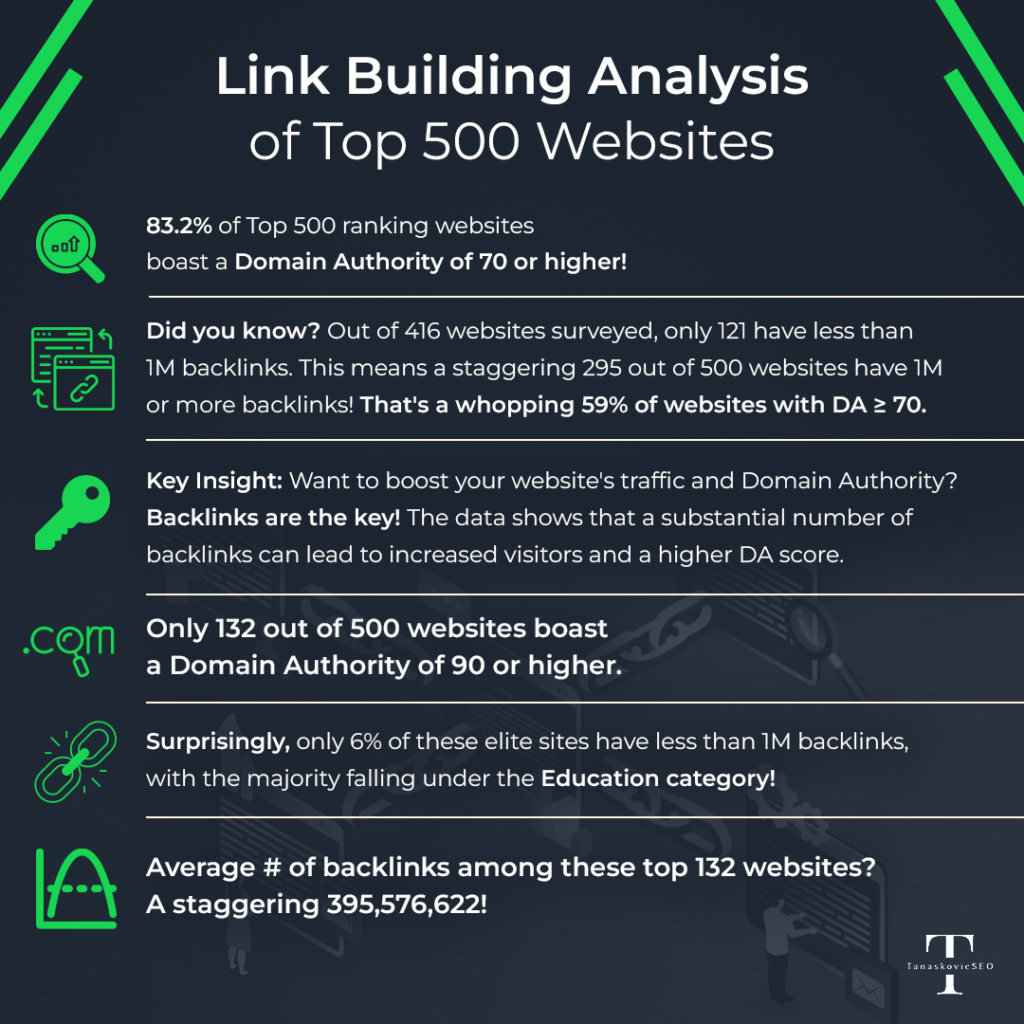
Want more good news? Only 132 of the 500 websites I studied have a DA score of 90 or above. That means it’s possible to rank higher in search engines without top-level authority. Nice!
Now, let’s take a look at the data for each individual category I studied.
Backlink Analysis of the Top 100 News Websites
We’ll start with the news category.
As you would expect, Google News owns the largest number of backlinks. The tech titan currently has 1.9 billion (yes, billion) referring domains. On the other end of the spectrum, The New Global Order has 240 sites linking to it. This proves my point that you don’t need a killer backlink portfolio to rank.
That said, it definitely pays to generate links. On average, the news websites I studied have 222,268,926 backlinks. And 73.75% of news websites with a DA above 70 have one million links or more.
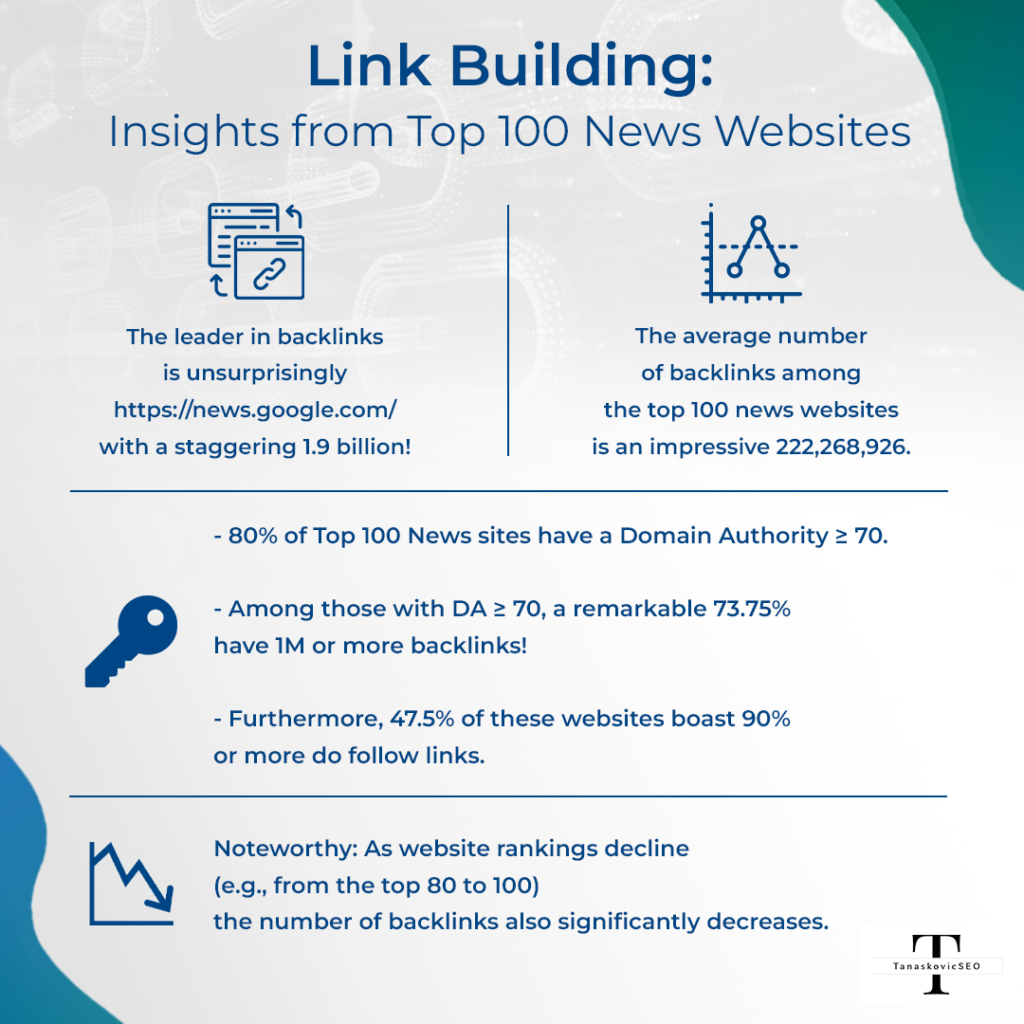
The Main Takeaways
While you don’t need one million links to rank, there’s a strong correlation between volume of backlinks and a website’s DA score in the news category. This makes sense; we all want reliable news sources. Building links helps websites become more authoritative and visible. If you happen to own and/or manage a news website, invest resources into link building tactics.
Backlink Analysis of the Top 100 E-Commerce Websites
Next up, e-commerce websites.
Amazon has more links than any of its competitors, which is exactly what you’d expect. The e-com giant currently has 2 billion (yes, billion) backlinks—even more than Google News.
Of all the e-commerce websites I studied, Vivo Shop has the fewest number of backlinks with 486. But the average number of backlinks in this category is 30,673,203 links.
Also worth mentioning, 90 out of the 100 e-commerce websites in this analysis have DA scores above 70. And of those 90 sites, 51 of them have at least one million backlinks.
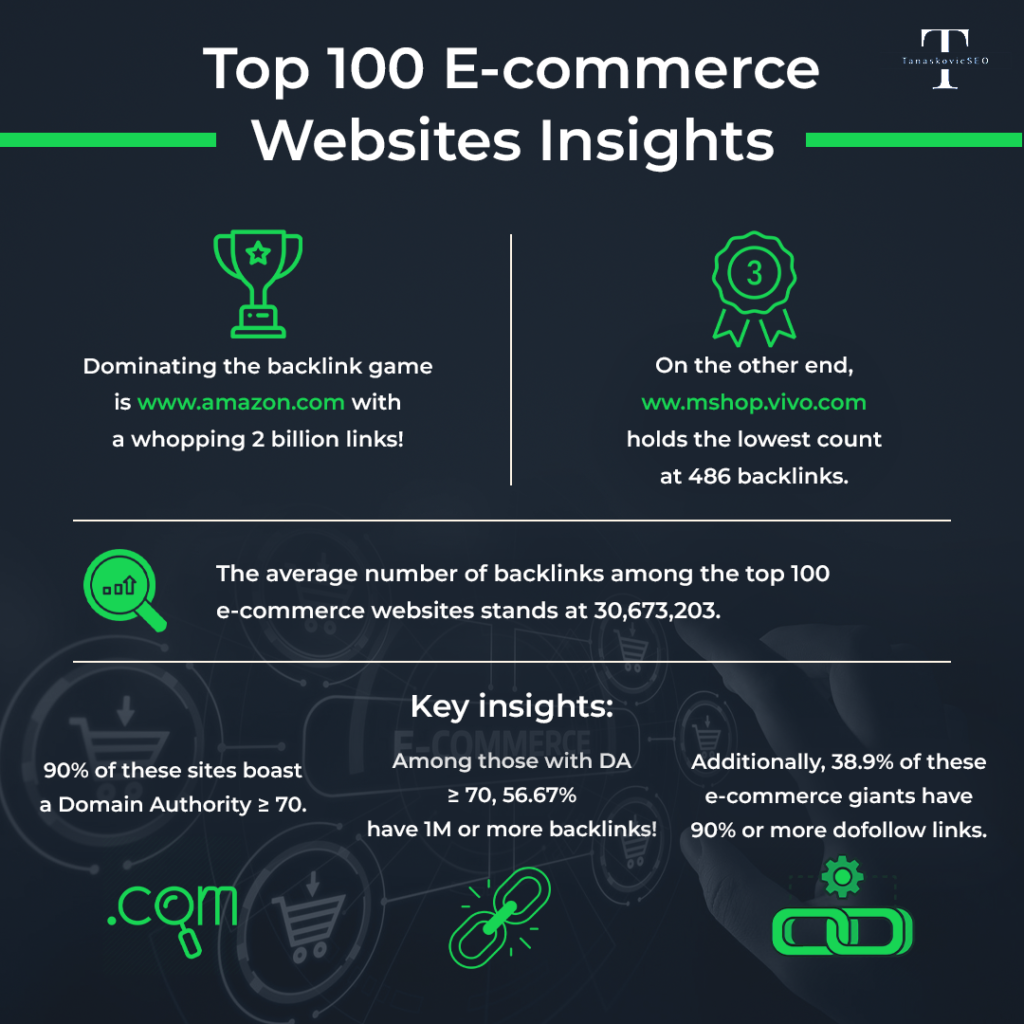
The Main Takeaways
Thanks to platforms like Shopify, anyone with a computer and a dream can start an online store. To thrive in this competitive space, you need to attract links. (As long as each referring domain is high quality, of course.) Good news: I’ve just taught you how to build a link building strategy!
Backlink Analysis of the Top 100 Education Websites
Do you work in the education space? Then you’ll be especially interested in this category.
According to my research, LinkedIn has an astounding 9 billion (yes, billion) backlinks—more than any other site in the space. Free Educational Resources brings up the rear with 445 backlinks. The average website in the education category has 121,290,752 backlinks.
(LinkedIn skews the data here. Remove it from the analysis and the average website in the education category has 26,566,315 backlinks.)
73% of the education websites I studied have a DA score of at least 70. Digging deeper, 60.2% of these sites have at least 1M links pointing back to their own domains.
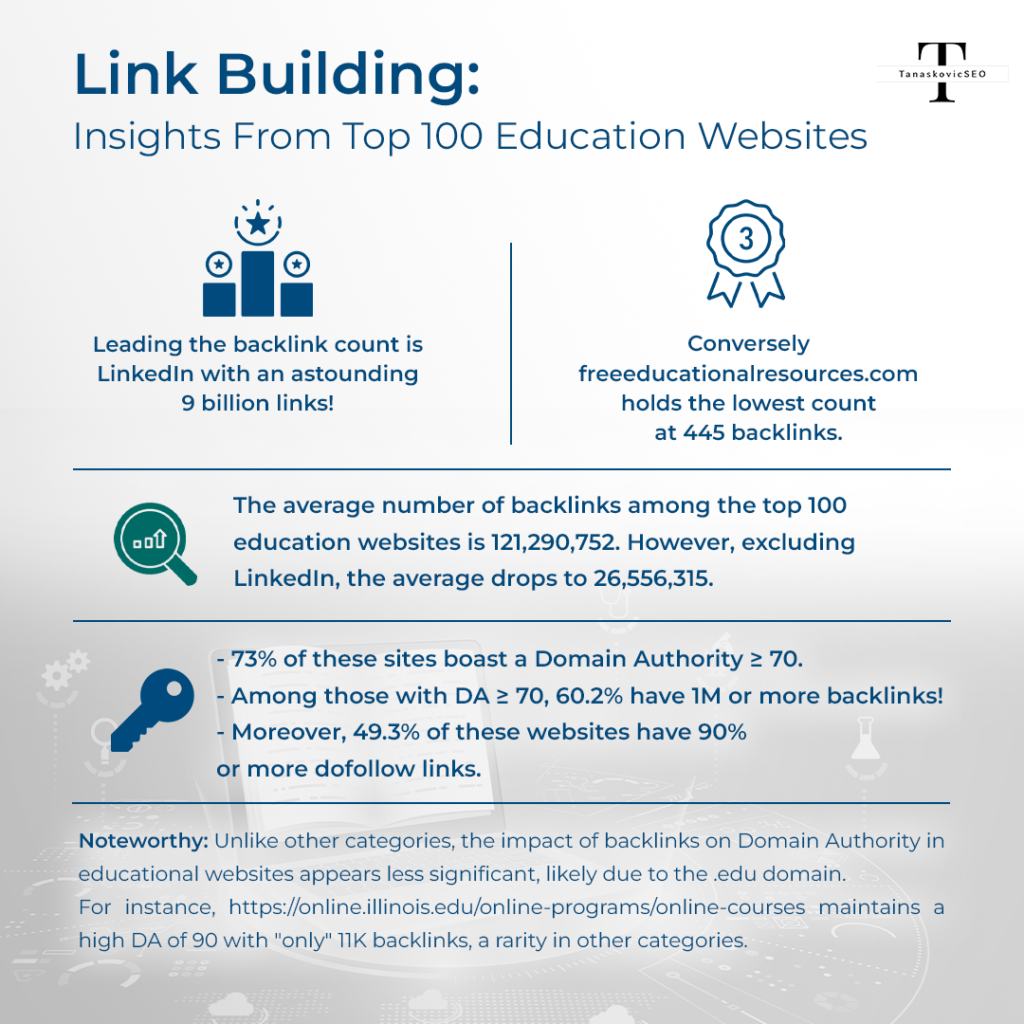
The Main Takeaways
Websites in the education category are not as dependent on backlinks as websites in other categories. Many education websites have impressive DA scores, even if they don’t have tons of linking domains. This is because educational sites are inherently trustworthy. I’m not saying that quality links in the educational space are worthless. But those who manage education websites do not need to search as diligently for link building opportunities.
Backlink Analysis of the Top 100 Tech Websites
What about the tech industry? Let’s take a look at the data:
Per my analysis, the tech website with the most backlinks is Wirecutter, a New York Times property. As of this writing, Wirecutter has 264M links pointing back to it. The top tech website with the least amount of backlinks is DIPSODA, which clocks in at 696 inbound links.
On average, top sites in the tech space have 19,036,221 backlinks. Also of note, 92% of them have a DA score of at least 70. And 90.2% of these popular websites have 1M links or more.
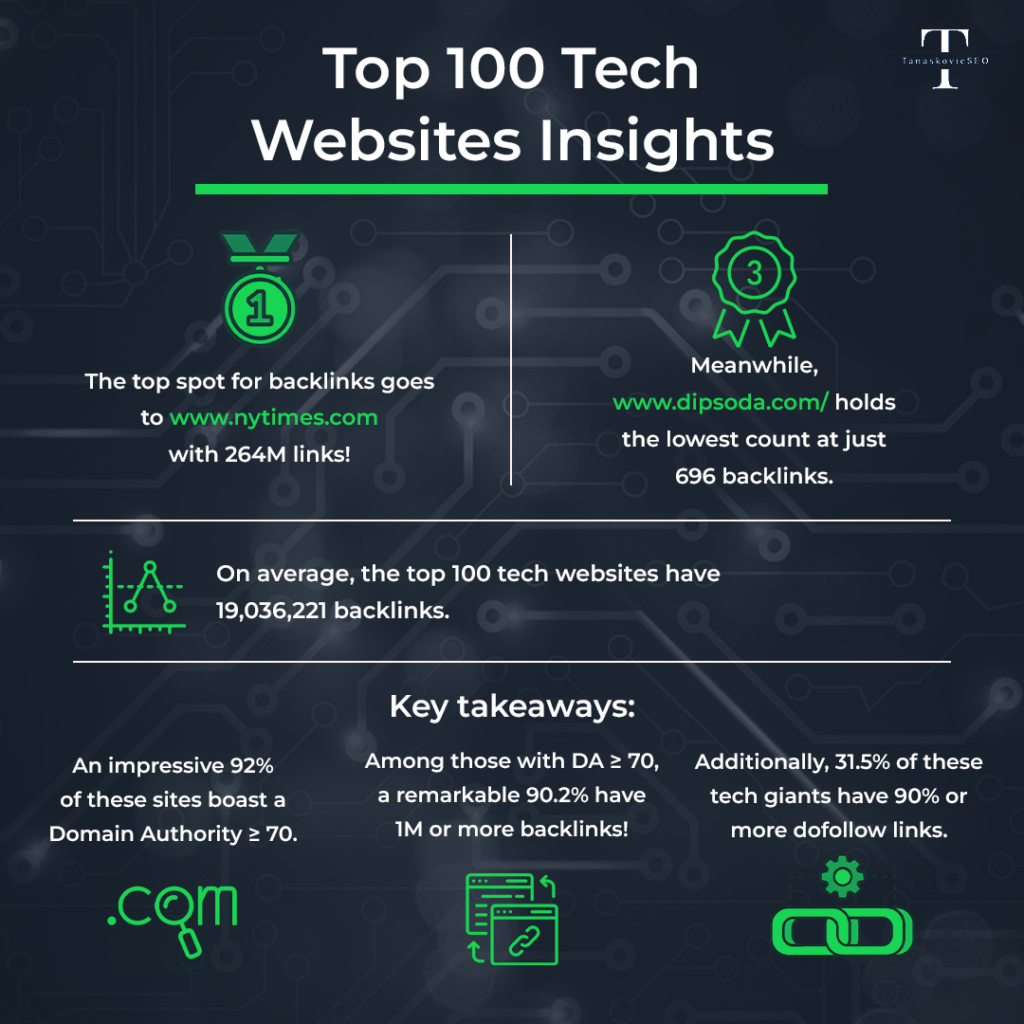
The Main Takeaways
I’m just going to say it: tech websites need to implement an effective link building strategy. You’ll have a hard time ranking in this space without links from relevant websites. That’s because the tech industry is extremely competitive—a fact that shouldn’t surprise anyone. If you want to achieve a high DA score and perform in search results, you need many referring domains, each with substantial link authority. Without these things, your Google ranking will suffer.
Backlink Analysis of the Top 100 Health Websites
Let’s finish up with a detailed look at the top websites in the health industry.
Of the sites I studied, The Guardian has the most backlinks with 147M. The lowest number of backlinks belongs to The Fit Map, which has 382. The average number of backlinks for top sites in the health space is 6,798,888. This is by far the lowest of all the categories I analyzed.
As for domain authority, 82% of health websites in this report score 70 or better. Of those websites, 61% have 1M+ backlinks, which helps them rank better in every search engine.
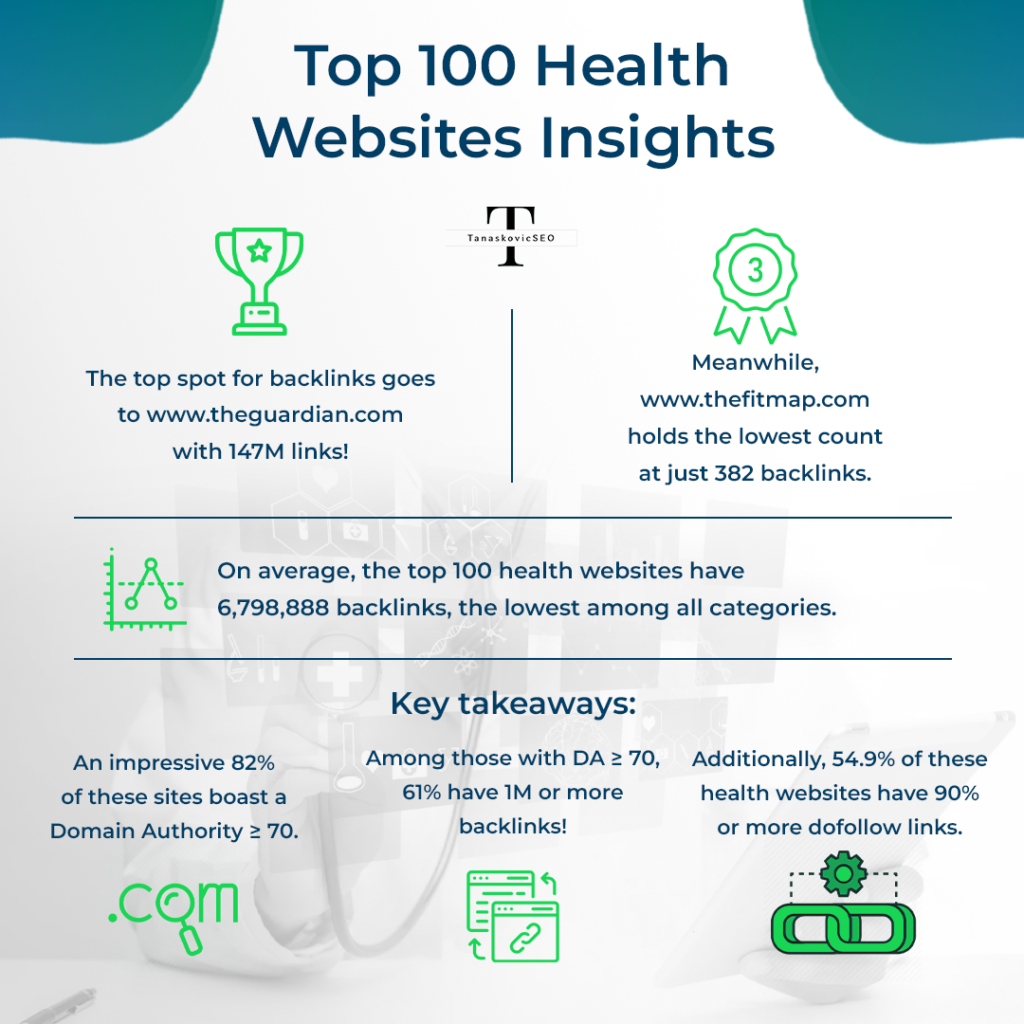
The Main Takeaways
In general, top health websites have fewer backlinks than sites in other categories. But the number of referring domains a site has still impacts its DA score and ability to rank. What does this tell us? That the health sector is competitive. Building a solid backlink portfolio is crucial.
Elevate Your Link Building Campaigns
Whew, we covered a lot in this blog post!
If you only remember a few things from this article, make sure it’s these three things:
- Building links is important—at least if you want to improve your SEO. To generate links for your website, create great content, implement a broken link strategy, invest in guest blogging, and look for opportunities to share your expertise.
- Many of the top news, e-commerce, education, tech, and health websites have tons of backlinks—but not all do. Try to deploy effective link building strategies, but don’t worry if your site has less than 1M links. It can still rank in Google search.
- That said, the more backlinks your site has, the higher its DA score will likely be. These things will make it easier for your content to rank. So always look for link opportunities. When other websites link to your content, it will be easier to reach your target audience.
I have good news: SEO professionals like myself can improve every aspect of your SEO strategy. Sign up to my newsletter for the latest tips on SEO-related topics. Or hire me to analyze your site, create content, and earn backlinks for you. I’m excited to work together!

Get the latest stories, exclusive insights, and special offers delivered straight to your inbox.
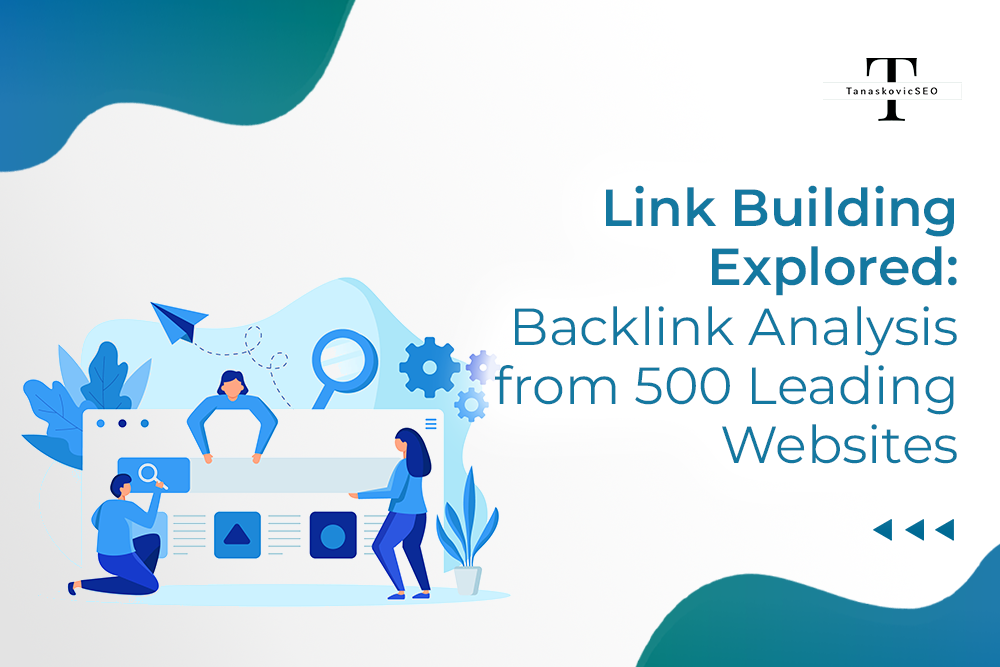
Leave a Reply
You must be logged in to post a comment.